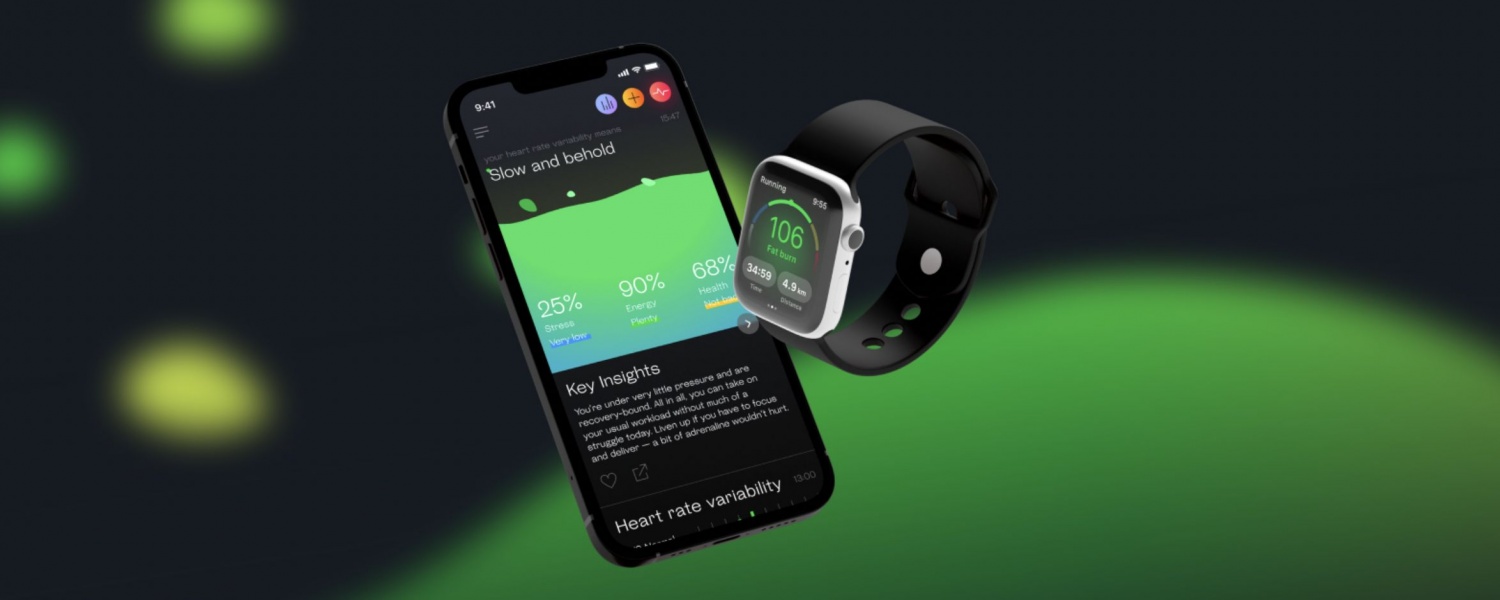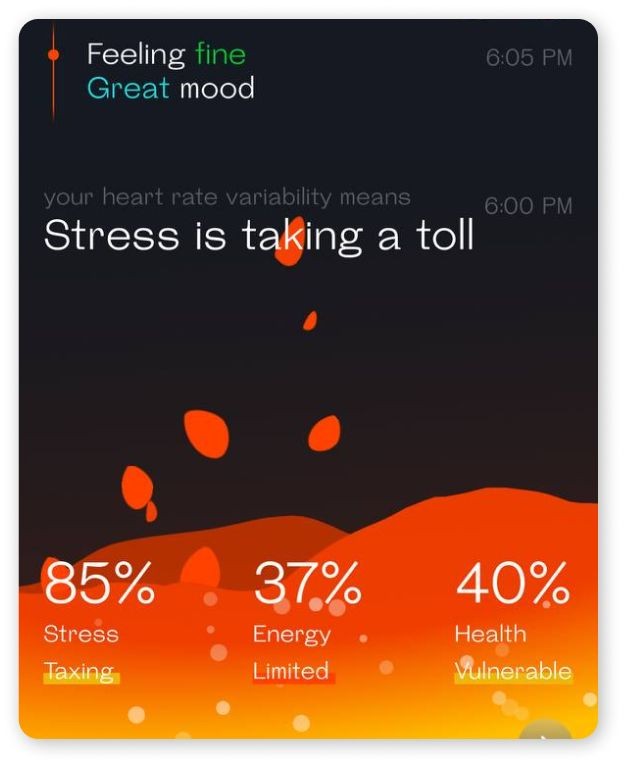
The management guru Peter Drucker once said, if you can't measure it, you can't manage it.
In this context, Although Drucker may have spoken about work, this famous principle also applies to our health. We use numerous apps and fitness trackers to support our activities. The data derived from them is extensive and valuable but can also be quite overwhelming. We can see our daily steps and calories burned, but do we know how to interpret the numbers displayed?
The loss of valuable insights that could be gained through this data is why a third of people who buy fitness trackers stop using them within six months.
That's precisely why we created Welltory. Every day, Welltory interprets your health & fitness data from connected apps & gadgets to show you how your body works, which habits impact you most, and what you can do to feel better right now - not months from now.
After six years of development and 5 million installs, we can share these five reasons why you should start self-tracking today.
#1. To stop dismissing your body's signals
At Welltory, we often get feedback such as: "I feel great, I'm on vacation doing nothing but relaxing - and yet your app keeps telling me that I'm about to become ill or should rest."
What your body's experiencing and what you feel are two separate things. Sure, they can sometimes coincide, but they can also contradict each other, and that's completely normal.
Let's take this user's case. They say they feel great, they're relaxing - yet their heart rate variability shows that their body's in overdrive and that they need to take it down a notch.
There are a couple of possible reasons for this:
Their stress is chronic. If most of their time is filled with work 24/7, if they eat too many highly processed foods and refined sugar, if they don't exercise and don't have a strong support system of friends and family - two weeks of sunbathing won't fix the chronic stress they're under.

They aren't really resting. Have you ever sat down on the couch to watch some TV, and then, three hours later, you feel as tired and grumpy as you felt before? Yeah, that might be the case if your stress levels aren't going down. There's nothing wrong with watching TV on the couch while hugging a bucket of ice cream every once in a while - but that's still stimulating for the brain. Therefore, it should at least be complemented by physical activities such as mindful walks in nature or stretching, restorative sleep, meditations, and making memories with friends.
What we're trying to say is that it's perfectly normal for your mood to be great and yet have high levels of stress. This is where self-tracking helps - you can see the data that tells you, 'You're not resting, you need to relax,' - which might lead you to pay more attention to your body and get the rest it actually needs.
#2. To know what affects your health
Our nervous system constantly scans our body and adapts to specific changes to keep things running smoothly: blood pressure, temperature, heartbeat, etc.
For example, say you started meditating, taking vitamins, or moved to a country with a different climate. Changes in your variability can show you if it's impacting your body positively. Or say, for example, you don't feel any adverse effects from drinking or smoking on your body, but you're worried and want to know if there really are any.
That's where self-tracking helps: You can see your readings before the activity you want to track and then after for you to see if they changed. It's not perfectly executed research, of course, but when you track something for a while, you'll be able to see if there's any correlation, at least.

This helps with motivation, as well. We all know, for example, that you need to sleep 7-9 hours a day. Do we all do that? Not really, at least not regularly. But if you see on your data that you are way more productive and focused if you get eight hours of sleep, whilst when you get less, you have way less energy and complete fewer tasks - it just might change your perspective. Or if you see that after a few minutes of vaping, your stress levels are peaking, it would probably be more effective in helping you cut down than the abstract 'It's bad for your lungs' speech.
#3. To stop feeling overwhelmed by your goals
Let's say your goal is to lose weight or get stronger, or learn how to code.
These are all great goals - but they're also massive.
At the start of your journey, they loom above you like huge mountains you must climb. But if you track your progress every week, for example, you'll recognize a path of progress. You'll be able to know that you've actually gotten closer to the top of the mountain, and you'll learn to appreciate the milestones you passed along the way.

Another excellent example of the benefits of self-tracking is that you learn to celebrate every step you've taken. You might not feel the change or see it in the mirror - but the data is right there in front of you. And it shows you've lost a few pounds, you lift more than you could last week, and you can now make a list of your coding skills.
This kind of positive reinforcement makes our brain adapt to changes easier. Self-encouragement and data will give you the motivation to continue pursuing your goals.
#4. To build discipline and self-awareness
Motivation is great, but you can't improve your lifestyle with motivation alone. Our brains don't like doing hard and demanding things.
There is research stating that highly impulsive people don't see any value in self-tracking because they mostly get negative results. This same research says that people with higher self-control levels track their habits and get positive reinforcement more often.
So, there's a 'Catch-22' situation: You have to build your overall discipline to track your habits, but you also have to track your habits to build discipline.
Here's why we think you should start with self-tracking: Just to see what's going on with you. Sure, you might not like some of the results you get - but you'll become more self-aware. And once you know that you don't sleep enough, or that you eat too much refined sugar, or that you barely walk during the day - you can build from there.
You'll probably have to face your frustration at the beginning, but the more self-aware you are, the more mindful you will be - and there's no better cure for acting out of frustration than mindfulness.
#5. To get to know the real you
Data doesn't lie - it's as simple as that. So the more self-tracking you do, the more inevitable is the moment when you truly know yourself.
It might sound a bit dramatic, but you are mostly the sum of your actions - actions translate into some sort of change, big or small, positive or negative, or barely visible, while thoughts and words remain what they are.
When you start tracking your actions, you can measure the changes that have happened. Not only will this develop your self-awareness, but it will also eventually become a tool to help you take control of your life, and make your decisions better and more informed.

If you genuinely want to know yourself deeper, join the self-tracking evolution. Self-tracking keeps us honest when we are self-reflecting, and it can also help us see the unexpected things that are influencing our health, wellbeing, and outcomes.
If you want to know yourself better, you can start with Welltory - the science-backed app that helps you form, remember and analyze your lifestyle. To encourage you to start the journey, here's a promo code for your first Welltory subscription.
Welltory
- US-based IT company with over 5 million downloads and over 60 000 5-star ratings.
- A global remote team united by one mission: to help people live healthier, happier, and more productive lives.
- Arizona State University and University College London have used the Welltory App as a scientific research tool.
* This is a contributed article and this content does not necessarily represent the views of techtimes.com








